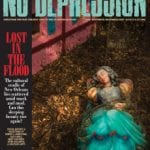Mary Gauthier- Some thoughts on the past, present and future of New Orleans music. Hoping for the best.
I was born in New Orleans, raised in Baton Rouge, and I have family that lives all over South Lafourche. Ever since I was a little girl, I was told that if New Orleans were to take a direct hit with a major storm, it would be catastrophic because New Orleans sits below sea level. That is mostly a man-made problem, the result of the levees built after the last major flood that hit the area, in 1927.
Before Katrina hit, the Great Mississippi River Flood of 1927 was the most destructive flood in U.S. history. Randy Newman’s song “Louisiana 1927” tells the story of that disaster: “Six feet of water in the streets of Evangeline…Louisiana, they’re trying to wash us away.” (I grew up listening to different versions of that song; I was particularly fond of Aaron Neville’s.)
The flood of ’27 propelled then Secretary of Commerce Herbert Hoover, in charge of flood relief operations, into the national spotlight, setting the stage for his election to the presidency the following year. It also helped Huey Long become Louisiana’s governor in 1928.
During the disaster of ’27, 700,000 people were displaced, including 330,000 African-Americans, who were moved to relief camps. Over 13,000 mostly black refugees near Greenville were gathered from area farms and evacuated to the crest of an unbroken levee, then stranded there for days without food or clean water, while boats arrived to evacuate white women and children. Many African-Americans were detained and forced to labor at gunpoint during flood relief efforts. (This time there were no free workers held at gunpoint, but on September 8, president Bush issued a proclamation suspending the law that requires employers to pay the locally prevailing wage to construction workers on federally financed projects, and the prevailing wage is less that $18,000 a year.)
In 1927, several reports on the conditions in the refugee camps were kept out of the media at the request of Hoover, with the promise of further reforms for blacks after the presidential election. After the election, when Hoover failed to keep his promise, influential African-Americans helped to shift the allegiance of black Americans from the Republican Party, for whom they had voted since before Lincoln, to Franklin Delano Roosevelt and the Democrats. The aftermath of the flood was also an important factor in the great migration of African-Americans to northern cities.
It looks like we have another great migration under way, and I wonder what’s going to happen this time. Who is going to end up where? What new musical forms will be created, and what new kinds of gumbo will be boiling out there when people who have managed to survive the water and the wind and the violence settle into new lives in new cities? What will the political landscape look like after the bodies are counted and buried, the levees are properly fixed, and the people collectively process what they think and feel about what happened?
The flood of 1927 resulted in considerable cultural output, inspiring a great deal of folklore and folk music. Charlie Patton, Bessie Smith and many other Delta blues musicians wrote numerous songs about the flood; Kansas Joe McCoy and Memphis Minnie’s “When The Levee Breaks” was reworked by Led Zeppelin and became one of that group’s most enduring songs. Then there is this beautiful chorus written by Jed Hopkin, a big sheet music hit back in the day:
On the Mississippi shore
I’m alone in the silvery light
Andy my poor heart is aching for
Those who sleep in the waters tonight
While hanging out around town here in Nashville, I’ve already heard several new songs about this disaster. I guess we songwriters try to write about what’s happening because it’s simply what we do, how we contribute, how we try to make sense of a world that sometimes seems to make no sense at all.
I hope our elected officials come up with an actual plan that will work for people down there the next time a big storm comes. As for me, my sister and I have worked with the director of my father’s nursing home, and we now have a plan in place that will get us through the current hurricane season. Come next summer when hurricane season rolls around again, if daddy lives that long, we’ll revisit our plan and make sure we still have one that works. And I can guarantee you that hoping for the best won’t be its foundation.




